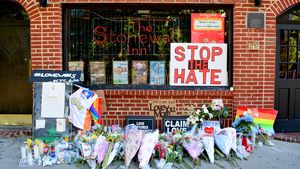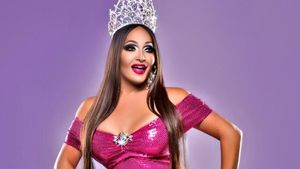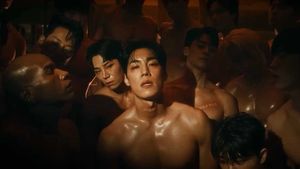For LGBT people, especially youth, queer musicians can be one of the best comforts to have. Seeing a queer music artist making good music while being out and proud makes the world a little better to live in when times are tough. ROES, the queer hip-hop artist formerly known as Angel Haze, has inspired me both artistically and personally since I first discovered their work.
Prior to ROES, there wasn't a single bone in my body that connected to hip-hop. Even though I'm Black, hip-hop used to sound like electronica music to me. The tough, raunchy attitudes of Black female MCs wasn't enough for a sensitive soul like myself. I wanted a more vulnerable and introspective hip-hop artist to like, and finding one felt like looking for a needle in a haystack.
In late 2012, I came across ROES while browsing an arts and culture website for millennials. The first song of theirs I ever heard was a cover of Eminem's "Cleaning Out My Closet." Despite being a cover, ROES managed to make the song all their own through their raw storytelling that featured a graphic discussion of childhood sexual abuse.
Immediately after hearing the song, I looked up more of their work, downloading tracks from various mixtapes. I was drawn to ROES' artistry, especially how they could sing, rap, and perform spoken word. By combining poetic elements with frank vulnerability and swagger, ROES validated the angst and depression I had been experiencing for years and encouraged me to express myself through poetry.
One of the first ROES songs I connected to was called "Smile n Hearts." In it, they lament about how they feel out of place and heartbroken sometimes. My favorite part of the track is an interlude that features no music, just ROES speaking verses such as, "And even still, I wonder what it would feel like to be beautiful/to feel like rain on rose petals/to feel like sunshine/and have a life without suffering constantly."
With their music in the background, I started writing poetry to vent my personal pain and negative emotions. One unpublished poem, entitled "99 Bottles," discussed some of the insecurities I kept hidden away from others. It wasn't a masterpiece or anything, but it made me feel lighter inside. And an influence on "99 Bottles" was ROES' spoken word poem "Who I Am."
The mark left by the artist formerly known as Angel Haze has been incredible. They have been unabashedly vulnerable, tenacious, and queer, winning the hearts of many. One of their best songs is a very personal cover of Macklemore's "Same Love," which beats the original any day. In the very last verse, ROES states, "I am living today as someone I had not become yesterday." A lyric that demonstrates how fully they are willing to live their truth.
The most recent poem of mine that was written while listening to ROES is called "I Need A Spell." The thing about ROES' overall body of work is that it urges you to take a look inside yourself and try and heal your hurts. I wrote "I Need A Spell" in order to encourage myself as a writer and a person and I am grateful to have a musical artist that does the same.



































































